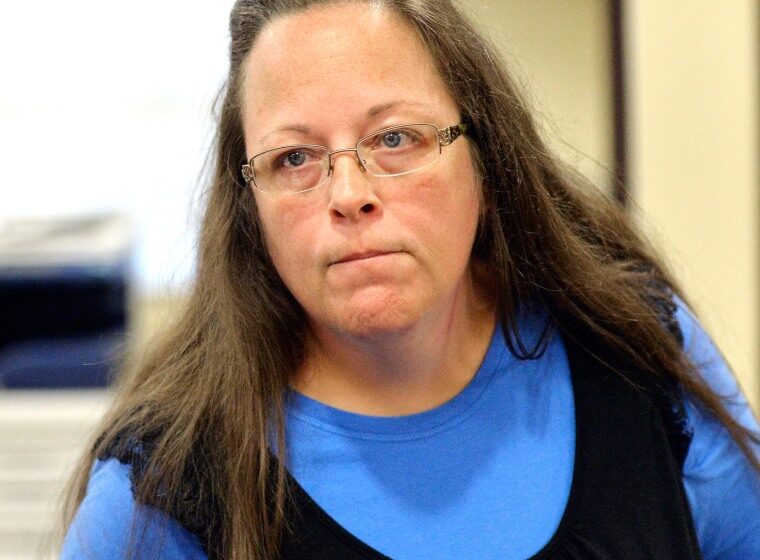Who is Kim Davis? Meet ex-Kentucky clerk pushing to overturn same-sex marriage ruling in US

Kim Davis, former Kentucky clerk, pushes Supreme Court to revisit landmark same-sex marriage ruling amid ongoing national debate.
In 2015, Kim Davis made headlines nationwide when she refused to issue marriage licenses to same-sex couples in defiance of the Supreme Court’s historic Obergefell v. Hodges ruling that legalized same-sex marriage across the United States. Now, nearly a decade later, Davis is back in the spotlight as she pushes the Supreme Court to reconsider that landmark decision. Her ongoing legal battle reignites a deeply divisive debate about religious freedom, civil rights, and the future of marriage equality in America.
Who Is Kim Davis?
Kim Davis is a former county clerk from Rowan County, Kentucky, who became a nationally recognized figure in 2015 due to her refusal to issue marriage licenses to same-sex couples. Born in 1965, Davis is an Apostolic Christian whose religious convictions have strongly influenced her actions and public stance. She held the position of county clerk from 2015 until 2019, during which time she became a symbol for religious conservatives opposing same-sex marriage.
READ ALSO
Supreme Court asked to overturn same-sex marriage ruling: What this means for gay couples in US
Her refusal to comply with the Supreme Court’s landmark ruling in Obergefell v. Hodges made her a polarizing figure, celebrated by some as a defender of religious liberty and criticized by others as engaging in unlawful discrimination. Davis’s actions resulted in legal challenges, jail time, and a high-profile court battle that continues to reverberate through the U.S. legal system.
The 2015 Controversy and Jail Time
Following the Supreme Court’s decision legalizing same-sex marriage nationwide in June 2015, Kim Davis refused to issue marriage licenses to same-sex couples citing her religious beliefs. Her stance directly conflicted with federal law and court orders.
In September 2015, after refusing a federal judge’s order to issue licenses, Davis was held in contempt of court and jailed for five days. During her incarceration, deputy clerks continued to issue marriage licenses to same-sex couples in her absence. Her jailing sparked a national debate over the conflict between religious freedom and LGBTQ+ rights.
Lawsuit and Damages Awarded
David Ermold and David Moore, a same-sex couple denied a marriage license by Davis, filed a federal lawsuit alleging their constitutional rights were violated. In 2022, a federal judge ruled against Davis, holding her liable for denying the couple their rights.
A jury awarded Ermold and Moore $100,000 in emotional damages. Subsequently, in late 2023, the court imposed approximately $260,000 in attorney fees against Davis, bringing the total financial liability to about $360,000.
Davis has challenged this verdict, arguing that her First Amendment rights protect her from personal liability.
Petition to the Supreme Court
In July 2025, Davis, backed by the conservative legal group Liberty Counsel, petitioned the Supreme Court to review her case. The petition requests the justices to reconsider and overturn Obergefell v. Hodges, which she and her legal team deem “egregiously wrong.”
Her attorney claims that the ruling violated religious freedom protections and that Davis should be immune from damages based on her sincere religious beliefs.
Broader Context and Impact
Kim Davis’s case symbolizes the ongoing cultural and legal tension between religious liberty claims and the rights of LGBTQ+ individuals. Her defiance and subsequent legal battle have energized conservative religious groups advocating for the rollback of marriage equality protections.
The Southern Baptist Convention has explicitly prioritized overturning Obergefell, and several states have introduced or passed legislation challenging marriage rights for LGBTQ+ couples.
While public support for same-sex marriage remains majority, the political and legal landscape continues to shift, especially with the Supreme Court’s conservative majority signaling openness to revisiting precedent.
What Kim Davis’s Case Means Moving Forward
If the Supreme Court agrees to hear her case, it could open the door to revisiting and potentially overturning the marriage equality ruling, though any such reversal would not nullify existing marriages due to protections like the Respect for Marriage Act.
The case raises complex questions about how courts balance religious conscience rights with the civil rights of others, a debate that will likely influence future legal battles on LGBTQ+ rights, religious exemptions, and civil liberties.

